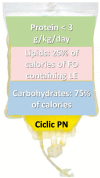Prevention and Treatment of Intestinal Failure-Associated Liver Disease in Children
- PMID: 29882922
- PMCID: PMC6024802
- DOI: 10.3390/nu10060664
Prevention and Treatment of Intestinal Failure-Associated Liver Disease in Children
Abstract
Intestinal failure-associated liver disease (IFALD) is a threatening complication for children on long-term parenteral nutrition because of intestinal failure. When progressive and intractable, it may jeopardize intestinal rehabilitation and lead to combined liver and intestinal transplantation. The institution of dedicated intestinal failure centers has dramatically decreased the incidence of such complication. IFALD may rapidly fade away if very early management aimed at preventing progression to end-stage liver disease is provided. In this review, we address the etiology and risk factors of IFALD in order to introduce pillars of prevention (nutritional management and catheter-related infections control). The latest evidence of therapeutic strategies, such as medical and surgical treatments, is also discussed.
Keywords: children; intestinal failure; liver disease; parenteral nutrition; prevention; treatment.
Conflict of interest statement
The authors declare no conflicts of interest.
Figures
Similar articles
-
Reversal of intestinal failure-associated liver disease in infants and children on parenteral nutrition: experience with 93 patients at a referral center for intestinal rehabilitation.J Pediatr Surg. 2010 Jan;45(1):84-7; discussion 87-8. doi: 10.1016/j.jpedsurg.2009.10.014. J Pediatr Surg. 2010. PMID: 20105585
-
Intestinal failure-associated liver disease: management and treatment strategies past, present, and future.Semin Liver Dis. 2007 Aug;27(3):251-8. doi: 10.1055/s-2007-985070. Semin Liver Dis. 2007. PMID: 17682972 Review.
-
The impact of intravenous fish oil emulsions on pediatric intestinal failure-associated liver disease.Curr Opin Organ Transplant. 2011 Jun;16(3):306-11. doi: 10.1097/MOT.0b013e32834670eb. Curr Opin Organ Transplant. 2011. PMID: 21505340 Review.
-
New insights into intestinal failure-associated liver disease in adults: A comprehensive review of the literature.Saudi J Gastroenterol. 2021 Jan-Feb;27(1):3-12. doi: 10.4103/sjg.sjg_551_20. Saudi J Gastroenterol. 2021. PMID: 33642350 Free PMC article. Review.
-
Intestinal Failure-Associated Liver Disease in Neonates.Neoreviews. 2020 Sep;21(9):e591-e599. doi: 10.1542/neo.21-9-e591. Neoreviews. 2020. PMID: 32873652 Review.
Cited by
-
Incidence and development of cholestasis in surgical neonates receiving an intravenous mixed-oil lipid emulsion.JPEN J Parenter Enteral Nutr. 2023 Jan;47(1):30-40. doi: 10.1002/jpen.2458. Epub 2022 Nov 15. JPEN J Parenter Enteral Nutr. 2023. PMID: 36308408 Free PMC article.
-
Fish Oil Based Lipid Emulsions for the Treatment of Intestinal Failure Associated Liver Disease: Nothing Fishy About it!Indian J Pediatr. 2019 Jun;86(6):494-495. doi: 10.1007/s12098-019-02944-1. Epub 2019 Apr 10. Indian J Pediatr. 2019. PMID: 30972700 No abstract available.
-
Novel Intravenous Nanoemulsions Based on Cannabidiol-Enriched Hemp Oil-Development and Validation of an HPLC-DAD Method for Cannabidiol Determination.Molecules. 2025 Jan 12;30(2):278. doi: 10.3390/molecules30020278. Molecules. 2025. PMID: 39860148 Free PMC article.
-
IFALD in children: What's new? A narrative review.Front Nutr. 2022 Jul 25;9:928371. doi: 10.3389/fnut.2022.928371. eCollection 2022. Front Nutr. 2022. PMID: 35958249 Free PMC article. Review.
-
Intestinal Continuity Alleviates Pediatric Intestinal Failure-Associated Liver Disease.Front Surg. 2022 May 16;9:881782. doi: 10.3389/fsurg.2022.881782. eCollection 2022. Front Surg. 2022. PMID: 35651678 Free PMC article.
References
-
- Lacaille F., Gupte G., Colomb V., D’Antiga L., Hartman C., Hojsak I., Kolacek S., Puntis J., Shamir R., ESPGHAN Working Group of Intestinal Failure and Intestinal Transplantation Intestinal failure-associated liver disease: A position paper of the ESPGHAN Working Group of Intestinal Failure and Intestinal Transplantation. J. Pediatr. Gastroenterol. Nutr. 2015;60:272–283. doi: 10.1097/MPG.0000000000000586. - DOI - PubMed
Publication types
MeSH terms
LinkOut - more resources
Full Text Sources
Other Literature Sources
Medical



